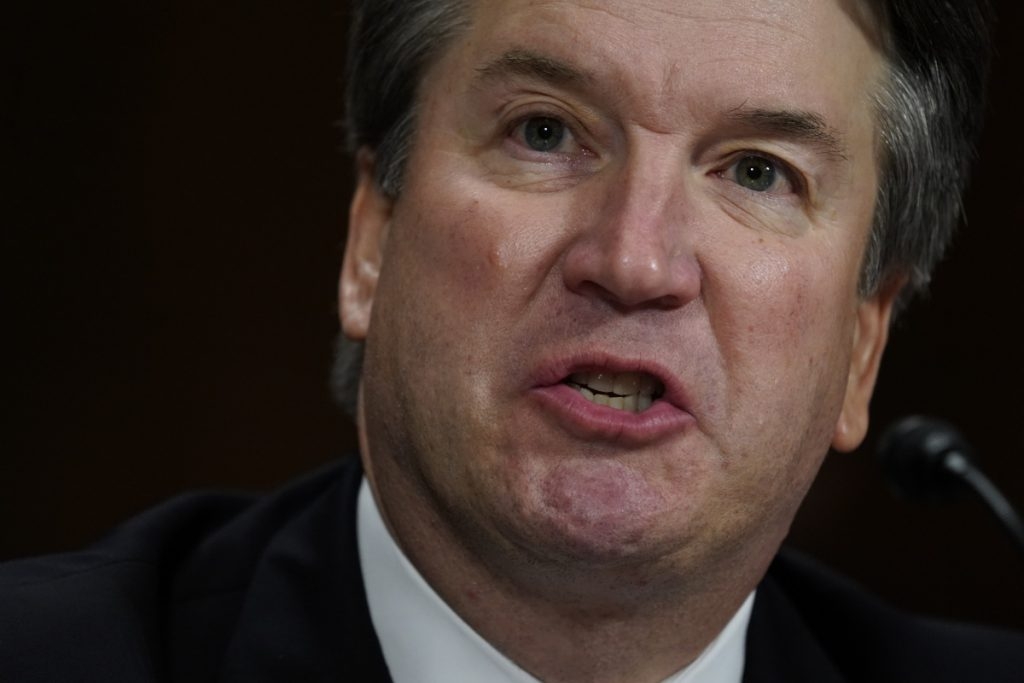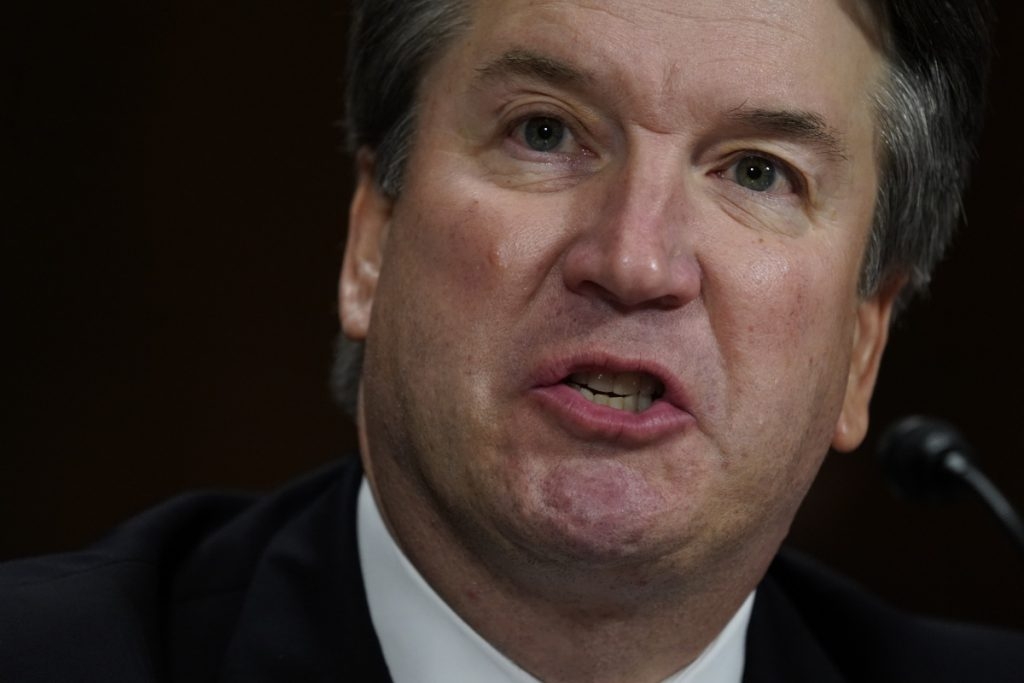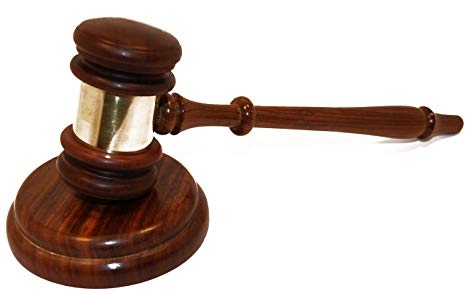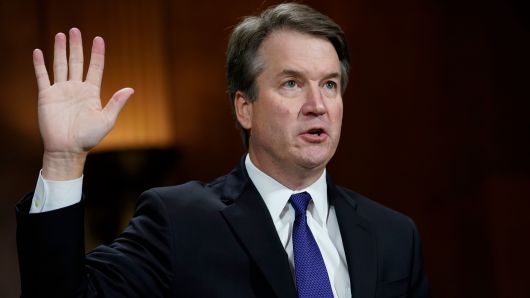Brett Kavanaugh is Unfit for the Supreme Court--Proof

The Senate Should Not Confirm Kavanaugh.
New update --- OCT. 3, 2018
The following letter will be presented to the United States Senate on Oct. 4. It will be updated as more signatures are received.
Judicial temperament is one of the most important qualities of a judge. As the Congressional Research Service explains, a judge requires “a personality that is even-handed, unbiased, impartial, courteous yet firm, and dedicated to a process, not a result.” The concern for judicial temperament dates back to our founding; in Federalist 78, titled “Judges as Guardians of the Constitution,” Alexander Hamilton expressed the need for “the integrity and moderation of the judiciary.”
We are law professors who teach, research and write about the judicial institutions of this country. Many of us appear in state and federal court, and our work means that we will continue to do so, including before the United States Supreme Court. We regret that we feel compelled to write to you, our Senators, to provide our views that at the Senate hearings on Sept. 27, Judge Brett Kavanaugh displayed a lack of judicial temperament that would be disqualifying for any court, and certainly for elevation to the highest court of this land.
The question at issue was, of course, painful for anyone. But Judge Kavanaugh exhibited a lack of commitment to judicious inquiry. Instead of being open to the necessary search for accuracy, Judge Kavanaugh was repeatedly aggressive with questioners. Even in his prepared remarks, Judge Kavanaugh described the hearing as partisan, referring to it as “a calculated and orchestrated political hit,” rather than acknowledging the need for the Senate, faced with new information, to try to understand what had transpired. Instead of trying to sort out with reason and care the allegations that were raised, Judge Kavanaugh responded in an intemperate, inflammatory and partial manner, as he interrupted and, at times, was discourteous to senators.
As you know, under two statutes governing bias and recusal, judges must step aside if they are at risk of being perceived as or of being unfair. As Congress has previously put it, a judge or justice “shall disqualify himself in any proceeding in which his impartiality might reasonably be questioned.” These statutes are part of a myriad of legal commitments to the impartiality of the judiciary, which is the cornerstone of the courts.
We have differing views about the other qualifications of Judge Kavanaugh. But we are united, as professors of law and scholars of judicial institutions, in believing that he did not display the impartiality and judicial temperament requisite to sit on the highest court of our land.
Signed, with institutional affiliation listed for identification purposes only, by the following:
Richard L. Abel Connell Distinguished Professor of Law Emeritus and Distinguished Research Professor, UCLA School of Law
David Abraham Professor of Law, University of Miami
Nancy S. Abramowitz Professor of Practice, American University Washington of Law
Kathryn Abrams Herma Hill Kay Distinguished Professor of Law, University of California Berkeley School of Law
Bruce Ackerman Sterling Professor of Law and Political Science, Yale Law School
Cynthia M. Adams Clinical Professor of Law, Indiana University Robert H. McKinney School of Law
Matthew Adler Professor of Law, Duke University
Muneer I. Ahmad Clinical Professor of Law, Yale Law School
Nadia B. Ahmad Associate Professor of Law, Barry University School of Law
Miriam R. Albert Professor of Skills, Hofstra University School of Law
Catherine Albiston Jackson H. Ralston Professor of Law, University of California, Berkeley
Janet Cooper Alexander Frederick I. Richman Professor of Law, Emerita, Stanford Law School
Robin J. Allan Professor of Legal Writing, Berkeley Law
Robin Allan Professor of Legal Writing, UC Berkeley Law School
Albert W. Alschuler Julius Kreeger Professor Emeritus, The University of Chicago Law School
Linda S. Anderson Professor of Law, Stetson University College of Law
Hiro N. Aragaki Professor of Law, Loyola Law School Los Angeles
Deborah N. Archer Associate Professor of Clinical Law, New York University School of Law
Catherine Archibald Associate Professor of Law, University of Detroit Mercy School of Law
Sabi Ardalan Assistant Clinical Professor, Harvard Law School
Margalynne Armstrong Associate Professor of Law, Santa Clara University School of Law
Pam Armstrong Professor of Law, Albany Law School
Robert Aronson Betts, Patterson & Mines Professor of Law Emeritus, University of Washington
Mayra C. Artiles Fonseca Adjunct Professor of Law, University of Puerto Rico, School of Law
Sameer M. Ashar Vice Dean for Experiential Education and Professor of Law, UCLA School of Law
Jeffery Atik Professor of Law, Loyola Law School, Los Angeles
Bernadette Atuahene Professor of Law, Chicago-Kent College of Law
Sahar Aziz Professor of Law, Rutgers Law School
Barbara Babcock Crown Professor of Law, Emerita, Stanford Law School
Jennifer Babcock Associate Professor of Law, Golden Gate Law
Mary Sue Backus Hugh Roff Professor of Law, University of Oklahoma College of Law
Kimberly Bailey Associate Professor of Law, Chicago-Kent College of Law
Susan Smith Bakhshian Clinical Professor & Director of Bar Programs, Loyola Law School -- Los Angeles
Paris R. Baldacci Clinical Professor Emeritus of Law, Cardozo School of Law
LaToya Baldwin Clark Assistant Professor of Law, UCLA School of Law
Beverly Balos Clinical Professor of Law Emerita, University of Minnesota
David Baluarte Associate Clinical Professor of Law, Washington and Lee University School of Law
Susan A. Bandes Centennial Professor of Law Emerita, DePaul University College of Law
Ralph Richard Banks Jackson Eli Reynolds Professor of Law, Stanford Law School
Mehrsa Baradaran Associate Professor of Law, UGA Law
Rita Barnett-Rose Professor of Legal Writing, Chapman University
Barbara S. Barron Professor of Skills, Maurice A. Deane School of Law Hofstra University
Margaret Barry Emeritus Professor, Vermont Law School
Laura B. Bartell Professor of Law, Wayne State University Law School
Elizabeth Bartholet Morris Wasserstein Public Interest Professor of Law, Harvard Law School
Katharine T. Bartlett A. Kenneth Pye Professor of Law, Duke University School of Law
Ann Bartow Professor of Law, University of New Hampshire School of Law
Mary Basick Associate Professor of Law, Southwestern Law School
Priya Baskaran Associate Professor of Law, West Virginia University School of Law
Marsha L. Baum Professor of Law, University of New Mexico
Valena Beety Professor of Law, West Virginia University College of Law
Julia Belian Associate Professor of Law, University of Detroit Mercy School of Law
Roxana S. Bell Assistant Professor of Law, University of Detroit Mercy School of Law
Kristen Bell Assistant Professor of Law, University of Oregon
Paul Bender Professor of Law, Arizona State University
Emily A. Benfer Visiting Associate Clinical Professor of Law, Columbia Law School
Cheryl Berg Professor of Legal Writing, UC Berkeley School of Law
Adele Bernhard Distinguished Adjunct Professor, New York Law School
Anya Bernstein Associate Professor of Law, SUNY University at Buffalo Law School
Anita Bernstein Anita and Stuart Subotnick Professor of Law, Brooklyn Law School --And many, many more....
I told you Brett Kavanaugh was unfit and will be a disgrace on the "High Court". Now, 650 Law Professors agreed with me!  CM
CM
Comments
-
Our View: Brett Kavanaugh has shown he doesn’t belong on the Supreme Court
The man who testified Thursday can't control his temper, he is overtly partisan and he doesn't always tell the truth.

Testifying before the Senate Judiciary Committee on Thursday, Supreme Court nominee Brett Kavanaugh blamed his troubles on bizarre conspiracy theories, dodged questions and displayed an explosive temper. Associated Press/Andrew HarnikDr. Christine Blasey Ford delivered emotionally devastating testimony Thursday, alleging that Supreme Court nominee Brett Kavanaugh tried to rape her when they both were teenagers.
Recalling the traumatic event, she gave the Senate more than enough reason to put on the brakes and fully investigate Kavanaugh’s past. We welcome the effort by a group of senators, which includes Maine Republican Susan Collins, to delay his confirmation vote until the FBI can dig deeper into all the allegations of sexual violence against the judge.
But regardless of what questions the investigation can answer, we already know this: Based on what he demonstrated in his own testimony, Kavanaugh lacks the character and judgment to serve on the Supreme Court.
In his widely watched appearance, Kavanaugh revealed that he has an explosive temper and resorts to bullying when he feels threatened. He was understandably under stress and fighting a high-stakes battle for his reputation, but his temperament was tested during the hearing, and he failed the test.
Kavanaugh also showed himself to be impermissibly political for a job that is supposed to be above politics. We’re not naive. We understand that federal judges are nominated by presidents and confirmed by senators, and that electoral politics influences their decisions about who gets to serve.
RIPPING OFF THE MASK
But we have never had a Supreme Court nominee who ripped off the nonpartisan mask the way Kavanaugh did Thursday and identified himself as an enemy of a political party that represents the policy preferences of millions of Americans. He blamed his predicament on bizarre conspiracy theories, claiming that his troubles stemmed from “pent-up anger about President Trump” and opponents seeking “revenge on behalf of the Clintons” and were not the result of allegations that emerged while he was being evaluated for an important job. After his partisan rant, Kavanaugh will never be able to judge a case without the animus he expressed being considered a factor in his decision. This is not the road we want to take.
And when he was talking about his high school years, he said things that, frankly, could not be believed. The self-proclaimed treasurer of the “100 Kegs or Bust” club says he was not much of a drinker.

It will not be over until this boy-Judge is kept off the bench or removed if put on the court. Kavanaugh is too bias, lack temperament, revengeful, and disgrace to the legal profession. If Kavanaugh gets on the Supreme Court, I promised you, he will be impeached! CM
-
Oh brother, the judicial temperament argument is just stupid. He has been fine on the courts.
-
@reformed said:
Oh brother, the judicial temperament argument is just stupid. He has been fine on the courts.In a 2015 speech, Judge Kavanaugh laid out his view of the value of "demeanor" for judges who want to be good "umpires." In part, he said this... (emphasis added)
"To be a good judge and a good umpire, it’s important to have the proper demeanor. Really important, I think. To walk in the others’ shoes, whether it be the other litigants, the litigants in the case, the other judges. To understand them. To keep our emotions in check. To be calm amidst the storm. On the bench, to put it in the vernacular, don’t be a jerk. I think that’s important. To be a good umpire and a good judge, don’t be a jerk. In your opinions, to demonstrate civility—I think that’s important as well. To show, to help display, that you are trying to make the decision impartially and dispassionately based on the law and not based on your emotions. That we’re not the bigger than the game…There’s a danger of arrogance, as for umpires and referees, but also for judges. And I would say that danger grows the more time you’re on the bench. As one of my colleagues puts it, you become more like yourself—and that can be a problem.
Did Judge Kavanaugh keep his emotions in check at last week's hearing? When he had THIS EXCHANGE with Sen Klobuchar, did he have his emotions in check: (emphasis added)
KLOBUCHAR: So you’re saying there’s never been a case where you drank so much that you didn’t remember what happened the night before, or part of what happened.
KAVANAUGH: It’s — you’re asking about, you know, blackout. I don’t know. Have you?
KLOBUCHAR: Could you answer the question, Judge? I just — so you — that’s not happened. Is that your answer?
KAVANAUGH: Yeah, and I’m curious if you have.
KLOBUCHAR: I have no drinking problem, Judge.
KAVANAUGH: Yeah, nor do I.
Also in that 2015 speech, Kavanaugh expressed deep loyalty to an impartial, non-partisan judiciary. "First and most obviously, he said, "a judge cannot be a political partisan." Judges must "avoid any semblance of…partisanship."
So when in his opening statement at last week's hearing, Kavanaugh said this... (emphasis added)
"This whole two-week effort has been a calculated and orchestrated political hit, fueled with apparent pent-up anger about President Trump and the 2016 election. Fear that has been unfairly stoked about my judicial record, revenge on behalf of the Clintons, and millions of dollars in money from outside left-wing opposition groups.
... did he "avoid any semblance of partisanship"?
-
If Kavanagh had wimped out, caved in, given up, turned into a cream puff during that train wreck of an accusation session, he would not be fit. He was a man, stood up for morality and integrity, right and honesty, fairness and justice. Kavanagh proved through trial by fire that he is fit like few have ever been.
Who here would say they are his equal? Speak up if you dare, else hold your tongue.
Post edited by GaoLu on -
The son of privilege did what he was accustomed to doing -- have a "hissy fit".

A vote for Kavanaugh is a vote for a boy-judge. He has shown us his real self. More of the same to come if the other justices don't agree with him. The countdown has begun. America give this man one of these:
 and not this:
and not this: 
Why should America reward bad behavior? CM
-
Yale roommate says Kavanaugh lied under oath about drinking and yearbook
By Kate Sullivan, CNN
Updated 10:14 PM ET, Wed October 3, 2018Washington (CNN)James Roche, one of Supreme Court nominee Brett Kavanaugh's freshman year roommates at Yale, said Wednesday that Kavanaugh lied under oath about his drinking and about the meaning of his yearbook entries.
In an op-ed for Slate, Roche writes, "Brett Kavanaugh stood up under oath and lied about his drinking and about the meaning of words in his yearbook. He did so baldly, without hesitation or reservation."
"In his words and his behavior, Judge Kavanaugh has shown contempt for the truth, for the process, for the rule of law, and for accountability," Roche added. "His willingness to lie to avoid embarrassment throws doubt on his denials about the larger questions of sexual assault."
Kavanaugh testified to the Senate Judiciary Committee that he has never been blackout drunk. He was appearing before senators to answer an accusation from California professor Christine Blasey Ford that he sexually assaulted her when they were both in high school in the early 1980s. Kavanaugh denies the allegation and says he has no memory of the party where Ford says the incident happened.
Roche says he believes his friend Deborah Ramirez, who has accused Kavanaugh of exposing himself to her at a college dorm party.Unfit! CM
-
@Bill_Coley said:
@reformed said:
Oh brother, the judicial temperament argument is just stupid. He has been fine on the courts.In a 2015 speech, Judge Kavanaugh laid out his view of the value of "demeanor" for judges who want to be good "umpires." In part, he said this... (emphasis added)
"To be a good judge and a good umpire, it’s important to have the proper demeanor. Really important, I think. To walk in the others’ shoes, whether it be the other litigants, the litigants in the case, the other judges. To understand them. To keep our emotions in check. To be calm amidst the storm. On the bench, to put it in the vernacular, don’t be a jerk. I think that’s important. To be a good umpire and a good judge, don’t be a jerk. In your opinions, to demonstrate civility—I think that’s important as well. To show, to help display, that you are trying to make the decision impartially and dispassionately based on the law and not based on your emotions. That we’re not the bigger than the game…There’s a danger of arrogance, as for umpires and referees, but also for judges. And I would say that danger grows the more time you’re on the bench. As one of my colleagues puts it, you become more like yourself—and that can be a problem.
Key words: ON THE BENCH
Did Judge Kavanaugh keep his emotions in check at last week's hearing? When he had THIS EXCHANGE with Sen Klobuchar, did he have his emotions in check: (emphasis added)
KLOBUCHAR: So you’re saying there’s never been a case where you drank so much that you didn’t remember what happened the night before, or part of what happened.
KAVANAUGH: It’s — you’re asking about, you know, blackout. I don’t know. Have you?
KLOBUCHAR: Could you answer the question, Judge? I just — so you — that’s not happened. Is that your answer?
KAVANAUGH: Yeah, and I’m curious if you have.
KLOBUCHAR: I have no drinking problem, Judge.
KAVANAUGH: Yeah, nor do I.
He wasn't on the bench last week Bill. Two different things.
Also in that 2015 speech, Kavanaugh expressed deep loyalty to an impartial, non-partisan judiciary. "First and most obviously, he said, "a judge cannot be a political partisan." Judges must "avoid any semblance of…partisanship."
So when in his opening statement at last week's hearing, Kavanaugh said this... (emphasis added)
"This whole two-week effort has been a calculated and orchestrated political hit, fueled with apparent pent-up anger about President Trump and the 2016 election. Fear that has been unfairly stoked about my judicial record, revenge on behalf of the Clintons, and millions of dollars in money from outside left-wing opposition groups.
... did he "avoid any semblance of partisanship"?
Then I guess Ginsberg needs to be impeached right? She disqualified herself during the 2016 elections right?
@C_M_ said:
Yale roommate says Kavanaugh lied under oath about drinking and yearbook
By Kate Sullivan, CNN
Updated 10:14 PM ET, Wed October 3, 2018Washington (CNN)James Roche, one of Supreme Court nominee Brett Kavanaugh's freshman year roommates at Yale, said Wednesday that Kavanaugh lied under oath about his drinking and about the meaning of his yearbook entries.
In an op-ed for Slate, Roche writes, "Brett Kavanaugh stood up under oath and lied about his drinking and about the meaning of words in his yearbook. He did so baldly, without hesitation or reservation."
"In his words and his behavior, Judge Kavanaugh has shown contempt for the truth, for the process, for the rule of law, and for accountability," Roche added. "His willingness to lie to avoid embarrassment throws doubt on his denials about the larger questions of sexual assault."
Kavanaugh testified to the Senate Judiciary Committee that he has never been blackout drunk. He was appearing before senators to answer an accusation from California professor Christine Blasey Ford that he sexually assaulted her when they were both in high school in the early 1980s. Kavanaugh denies the allegation and says he has no memory of the party where Ford says the incident happened.
Roche says he believes his friend Deborah Ramirez, who has accused Kavanaugh of exposing himself to her at a college dorm party.Unfit! CM
And where is the proof? First, was that roommate in High School with Kavanaugh? If he wasn't, how is he even valid to be talking about the yearbook? Second, did he give any examples of how he lied about his drinking?
Fake News.
-
Kavanaugh does not belong on Supreme Court, retired Justice Stevens says
(Reuters) - Retired U.S. Supreme Court Justice John Paul Stevens said on Thursday that Supreme Court nominee Brett Kavanaugh does not belong on the high court because of "potential bias" he showed in his recent Senate confirmation hearing.
Speaking to an audience of retirees in Boca Raton, Florida, Stevens, 98, said he started out believing that Kavanaugh deserved to be confirmed,
"but his performance during the hearings caused me to change my mind."
Stevens cited commentary by Harvard University law professor Laurence Tribe and others suggesting Kavanaugh had raised doubts about his political impartiality when he asserted that sexual misconduct accusations he faced stemmed from an "orchestrated political hit" funded by left-wing groups seeking "revenge on behalf of the Clintons."
Kavanaugh had spent more than three years working for Ken Starr, the independent counsel who investigated Democratic President Bill Clinton in the 1990s.
Kavanaugh also testified last week that allegations against him were being fueled by "pent-up anger" over the 2016 election of President Donald Trump, who nominated Kavanaugh to fill the Supreme Court vacancy created by the retirement of Justice Anthony Kennedy.
In a Wall Street Journal op-ed on Thursday, Kavanaugh said he "might have been too emotional at times" in his testimony. Kavanaugh wrote that his testimony "reflected my overwhelming frustration at being wrongly accused."
Some critics have argued that Kavanaugh's highly partisan remarks so compromised his ability to appear politically fair-minded that he would be forced to recuse himself on many cases to preserve the integrity of court's integrity.
Stevens said he, too, has come to believe that Kavanaugh, a U.S. appellate judge,
"demonstrated a potential bias involving enough potential litigants before the (high) court that he would not be able to perform his full responsibilities."
"I think there’s merit in that criticism, and that the senators should really pay attention to it for the good of the court. It’s not healthy to get a new justice who can only do a par-time job," Stevens said.
Stevens, a lifelong Republican and appointee of President Gerald Ford who ended up as a generally liberal voice on the court by the time he retired in 2010, spoke at an event hosted by a Palm Beach Post reporter. Video of his remarks was shown by the C-SPAN television network.
Stevens acknowledged praising Kavanaugh and one of his rulings on foreign campaign contributions in his 2014 book “Six Amendments: How and Why We Should Change the Constitution.”
Stevens went on to say that his change of heart on Kavanaugh's fitness for the high court was "for reasons that have really no relationship to his intellectual ability or his record as a federal judge. He's a fine federal judge."
Asked whether questions raised about Kavanaugh's credibility during the hearings should be disqualifying, Stevens said, "Not necessarily."
Stevens also said political leaders and the court have failed to repair the nation’s confidence in the judicial branch’s separation from the president and the legislature.
“I think it’s worse, I regret to say it,” he said.
The U.S. Senate is scheduled to vote on Kavanaugh’s confirmation on Friday. An FBI report to the Senate Judiciary Committee concluded an investigation into allegations of sexual misconduct against Kavanaugh by California psychology professor Christine Blasey Ford and former Yale classmate Deborah Ramirez.
(Reporting by Bill Tarrant and Steve Gorman in Los Angeles; Editing by Bill Berkrot and Leslie Adler)
Kavanaugh lacks temperament! Proof from one who know even more than I do. CM
-
@C_M_ said:
Kavanaugh does not belong on Supreme Court, retired Justice Stevens says
(Reuters) - Retired U.S. Supreme Court Justice John Paul Stevens said on Thursday that Supreme Court nominee Brett Kavanaugh does not belong on the high court because of "potential bias" he showed in his recent Senate confirmation hearing.
Speaking to an audience of retirees in Boca Raton, Florida, Stevens, 98, said he started out believing that Kavanaugh deserved to be confirmed,
"but his performance during the hearings caused me to change my mind."
Stevens cited commentary by Harvard University law professor Laurence Tribe and others suggesting Kavanaugh had raised doubts about his political impartiality when he asserted that sexual misconduct accusations he faced stemmed from an "orchestrated political hit" funded by left-wing groups seeking "revenge on behalf of the Clintons."
Kavanaugh had spent more than three years working for Ken Starr, the independent counsel who investigated Democratic President Bill Clinton in the 1990s.
Kavanaugh also testified last week that allegations against him were being fueled by "pent-up anger" over the 2016 election of President Donald Trump, who nominated Kavanaugh to fill the Supreme Court vacancy created by the retirement of Justice Anthony Kennedy.
In a Wall Street Journal op-ed on Thursday, Kavanaugh said he "might have been too emotional at times" in his testimony. Kavanaugh wrote that his testimony "reflected my overwhelming frustration at being wrongly accused."
Some critics have argued that Kavanaugh's highly partisan remarks so compromised his ability to appear politically fair-minded that he would be forced to recuse himself on many cases to preserve the integrity of court's integrity.
Stevens said he, too, has come to believe that Kavanaugh, a U.S. appellate judge,
"demonstrated a potential bias involving enough potential litigants before the (high) court that he would not be able to perform his full responsibilities."
"I think there’s merit in that criticism, and that the senators should really pay attention to it for the good of the court. It’s not healthy to get a new justice who can only do a par-time job," Stevens said.
Stevens, a lifelong Republican and appointee of President Gerald Ford who ended up as a generally liberal voice on the court by the time he retired in 2010, spoke at an event hosted by a Palm Beach Post reporter. Video of his remarks was shown by the C-SPAN television network.
Stevens acknowledged praising Kavanaugh and one of his rulings on foreign campaign contributions in his 2014 book “Six Amendments: How and Why We Should Change the Constitution.”
Stevens went on to say that his change of heart on Kavanaugh's fitness for the high court was "for reasons that have really no relationship to his intellectual ability or his record as a federal judge. He's a fine federal judge."
Asked whether questions raised about Kavanaugh's credibility during the hearings should be disqualifying, Stevens said, "Not necessarily."
Stevens also said political leaders and the court have failed to repair the nation’s confidence in the judicial branch’s separation from the president and the legislature.
“I think it’s worse, I regret to say it,” he said.
The U.S. Senate is scheduled to vote on Kavanaugh’s confirmation on Friday. An FBI report to the Senate Judiciary Committee concluded an investigation into allegations of sexual misconduct against Kavanaugh by California psychology professor Christine Blasey Ford and former Yale classmate Deborah Ramirez.
(Reporting by Bill Tarrant and Steve Gorman in Los Angeles; Editing by Bill Berkrot and Leslie Adler)
Kavanaugh lacks temperament! Proof from one who know even more than I do. CM
Again, he has not shown bias from the bench. This means nothing. If it truly meant something, the Ginsberg should be thrown off the court. She is not impartial off the bench (or on it).
-
If you would only read what the Retired U.S. Supreme Court Justice John Paul Stevens said.
Kavanaugh has shown us enough of himself, his thinkings and how he will rule (revengefully). He swore to God. Don't deny his own, handwritten, well thought-through prepared statement. CM

US Supreme Court nominee Brett Kavanaugh is sworn in to testify before a Senate Judiciary Committee confirmation hearing on Capitol Hill in Washington, DC on September 27, 2018.
-
@C_M_ said:
If you would only read what the Retired U.S. Supreme Court Justice John Paul Stevens said.
Kavanaugh has shown us enough of himself, his thinkings and how he will rule (revengefully). He swore to God. Don't deny his own, handwritten, well thought-through prepared statement. CM

US Supreme Court nominee Brett Kavanaugh is sworn in to testify before a Senate Judiciary Committee confirmation hearing on Capitol Hill in Washington, DC on September 27, 2018.
What about Ginsberg?
-
A mother and a pregnant woman are not the same. CM
-
@C_M_ said:
A mother and a pregnant woman are not the same. CM??? What does that statement have to do with anything?
Still waiting on your explanation on why Ginsberg has not disqualified herself from the court.
-
Answer: A mother and a pregnant woman are not the same. CM
-
Can you explain your cryptic answer.....
-
As for Kavanaugh, it's not over until its over. The sky watches. CM
-
Did God tell you that? Or did you just make that up too?
